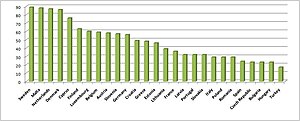
Back اللغة الإنجليزية في أوروبا Arabic Αγγλική γλώσσα στην Ευρώπη Greek زبان انگلیسی در اروپا Persian Anglais en Europe French Bahasa Inggris di Eropa ID Lingua inglese in Europa Italian ヨーロッパにおける英語 Japanese Англійська мова в Європі Ukrainian Tiếng Anh tại châu Âu Vietnamese
This article needs additional citations for verification. (May 2023) |


The English language in Europe, as a native language, is mainly spoken in the United Kingdom and Ireland. Outside of these states, it has official status in Malta, the Crown Dependencies (the Isle of Man, Jersey and Guernsey), Gibraltar and the Sovereign Base Areas of Akrotiri and Dhekelia (two of the British Overseas Territories). In the Netherlands, English has an official status as a regional language on the isles of Saba and Sint Eustatius (located in the Caribbean). In other parts of Europe, English is spoken mainly by those who have learnt it as a second language, but also, to a lesser extent, natively by some expatriates from some countries in the English-speaking world.
The English language is the de facto official language of England, the sole official language of Gibraltar and of Akrotiri and Dhekelia, and one of the official languages of Ireland, Malta, Northern Ireland, Scotland, Wales, the Isle of Man, Jersey, Guernsey and the European Union.
The United Kingdom and Ireland form a "European Anglosphere" with an area of about 316,000 km2 (122,000 sq mi) and a population of over 71 million.
According to a survey published in 2006, 13% of EU citizens then spoke English as their native language. Another 38% of EU citizens then stated that they had sufficient English skills to hold a conversation, so the total reach of English in the EU in 2006 was 51%.[2]
European English is known by a number of colloquial portmanteau words, including: Eurolish (first recorded in 1979), Eurish (1993) and Eurlish (2006).[3]
- ^ "EF English Proficiency Index 2019" (PDF). Retrieved 15 August 2024. (pp. 6–7).
- ^ a b Europeans and their Languages (2006)
- ^ Lambert, James. 2018. A multitude of ‘lishes’: The nomenclature of hybridity. English World-wide, 39(1): 24. DOI: 10.1075/eww.38.3.04lam